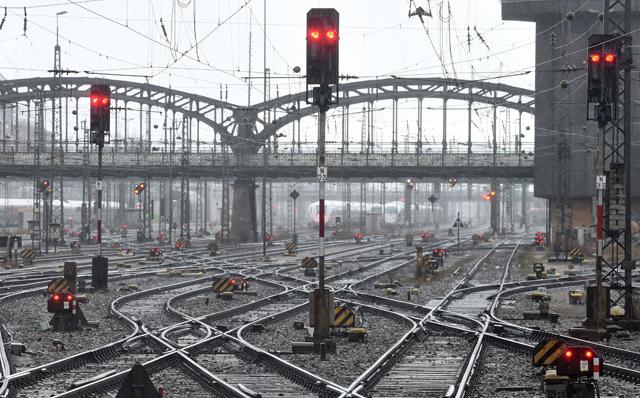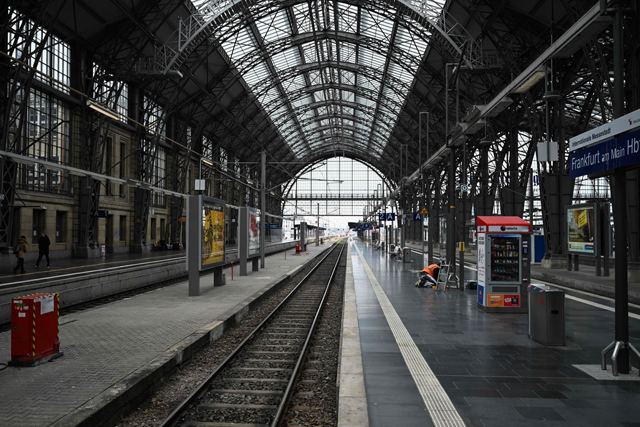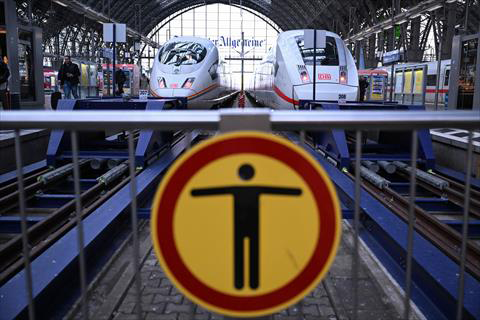You are here
German transport hobbled by train strikes, farmer blockades
By AFP - Jan 11,2024 - Last updated at Jan 11,2024

Highspeed ICE trains stand still in front of frankfurt's skyline at Frankfurt main station, western Germany, on Wednesday, as German train drivers start a nationwide three-day strike from after wage talks broke down, The GDL train drivers union has announced strike action for the period from January 10 up to January 12 (AFP photo)
BERLIN — Nationwide strikes brought German transport to a near standstill Wednesday, with railway workers on a three-day stoppage and farmers on tractors blocking autobahns in a bitter protest over subsidy cuts.
The ill-tempered sector disputes mark the start of what is expected to be a challenging year for Chancellor Olaf Scholz's unwieldy three-way government as it struggles with a weak economy and sinking popularity.
The GDL train drivers union called the strike on cargo as well as passenger routes after talks with public rail operator Deutsche Bahn hit an impasse. The company said 80 per cent of its long-distance trains weren't running.
Deutsche Bahn warned of "massive" disruptions to service until Friday evening, urging travellers to "avoid any unnecessary journeys" during the strike.
At Berlin's eerily deserted central station, student Philipp Kolb, 22, said the strike had complicated his travel plans.
"I was supposed to take the train to Hamburg at 6 am," he told AFP. "Now I have to push the trip back by three hours."
However passenger Piotr Bulej said he sympathised with striking drivers in the face of high inflation eating into real wages.
"People work a lot more hours with less money. The prices rise every day, every week," he said. "One has to protest, one has to say that."
'Continue the fight'
Following work stoppages in November and December, the current strike marks the longest in the protracted dispute over pay and working hours.
Beyond salary increases to offset inflation for the 10,000 employees it represents, the union is seeking a reduction to a 35-hour, four-day work week.
Deutsche Bahn said last month it had made an offer of an 11 per cent wage increase going into talks, as well as a bonus of up to 2,850 euros ($3,120).
The operator said Sunday it had come back last week with an improved offer representing a "major step forward".
But GDL chief Claus Weselsky dismissed the latest overture on Wednesday as a "provocation".
While stressing he was "ready for compromise", Weselsky told public broadcaster ZDF that "if there is nothing by Friday, we will take a break and then continue the fight".
'Rotten compromises'
The railway strike, which hit long-distance, regional and commuter lines, comes amid a week-long protest by angry farmers.
Travellers who hoped to beat the strike by taking their cars ran into further obstacles presented by tractor blockades across the country since Monday.
Some states gave pupils permission to stay home if their way to school was impeded while many office employees opted to work from home.
The sector has been up in arms over government plans to axe certain tax breaks for agriculture this year, which were announced after a shock court ruling forced the government to find savings in the 2024 budget.
German Farmers' Association president Joachim Rukwied also threatened more protests if demands for a full government reversal on the cuts were not met, cautioning against accepting "rotten compromises".
"On Monday we are going to stage a big demonstration in Berlin and we will consider further steps," he told ZDF, stressing that they were fighting for "a level playing field and fairness in the EU".
At a rally in the eastern city of Dresden, a few hundred demonstrators arrived on Theatre Square on farm equipment, brandishing signs reading "Without agriculture you'll go hungry" and, in a reference to beefed-up military spending, "You can't eat tanks".
Dairy farmer Luisa Hochstein, 26, told AFP that soaring costs put small farms like hers under huge pressure. "If it continues we'll end up importing more from abroad."
The government partially walked back the subsidy cuts last week in response to the outrage.
Scholz, whose government's approval rating has plummeted in recent months, on Monday ruled out further concessions, calling the cuts "right and balanced" and urging "orderly" protests.
A poll by independent institute Forsa found that 81 per cent expressed "understanding" for the farmers' protest.
Related Articles
BERLIN — German train drivers voted to go on strike from Tuesday over a wage dispute, their union said, in a blow for summer vacationers and
BERLIN — Hundreds of thousands of passengers in Germany faced travel misery on Thursday as rail and airport workers staged new strikes to ba
FRANKFURT — German train drivers will hold a six-day strike this week, the GDL union said, the longest walkout yet in an escalating row with














